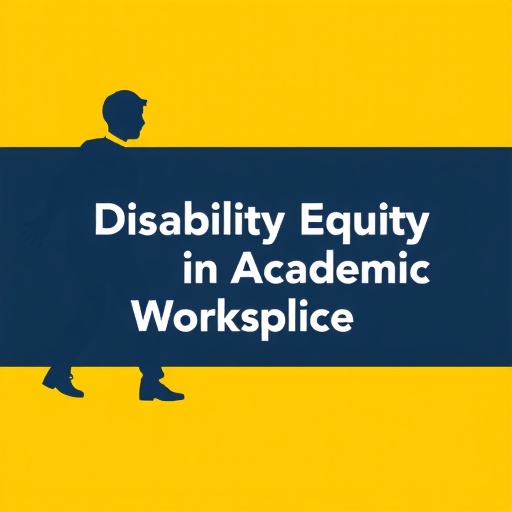In recent years, the discourse surrounding workplace equity has reached new heights, particularly within academic institutions. A recent case study, spearheaded by a collaboration among researchers Anicha, Bilen-Green, and Napoleon, has illuminated the critical need to advance disability equity in these environments. The findings from this pioneering research have potential implications for countless educational establishments, aiming to nurture inclusive atmospheres that value diversity and promote well-being among all employees.
The framework for this study revolves around an innovative professional development seminar designed explicitly for academic faculty. This seminar sought to engage participants in deep discussions relating to the challenges faced by individuals with disabilities within academic settings. The initiative aimed not only to raise awareness about disability rights issues but also to equip faculty members with the tools needed to create more accessible and supportive spaces for persons with disabilities.
At the heart of the seminar was a commitment to transformative learning. Traditional approaches to professional development often fall short of addressing the nuanced experiences of individuals with disabilities. By centering the dialogue around personal narratives and lived experiences, this seminar endeavored to create a shared understanding among participants of the barriers that disabled individuals frequently encounter. Engaging faculty in this manner proved essential; only through recognizing these challenges could they begin to foster a more inclusive academic environment.
Collectively, the participants delved into various topics concerning disability equity. They explored the systemic barriers entrenched within academic institutions that could inadvertently alienate colleagues with disabilities. The discussion revealed stark realities, such as the impact of physical infrastructures lacking appropriate accommodations and the pervasive biases often held by faculty regarding the capabilities of their disabled peers. Recognizing these inequities paved the way for generating actionable solutions.
One of the most profound insights derived from the seminar was the notion that disability is not merely a personal issue, but a collective responsibility. The academic community must mobilize as allies, turning discussions of equity from catchphrases into practical steps that manifest meaningful change. Such commitment begins with dismantling the age-old stereotypes surrounding disability, encouraging faculty to rethink their perceptions and behaviors toward their disabled colleagues.
In addition to raising awareness, the seminar facilitators introduced concrete strategies for fostering equity in academic workplaces. Participants were encouraged to consider flexible teaching methods, inclusive hiring practices, and the implementation of mentorship programs catering specifically to faculty with disabilities. Each of these approaches can contribute to a more welcoming academic atmosphere that honors diversity and encourages all members to thrive, irrespective of ability.
Research findings from the study also suggested that embedding disability equity within institutional frameworks is paramount. Simply holding an awareness seminar is insufficient; universities must establish ongoing commitments to improving accessibility within their policies and procedures. This could include regular audits of physical spaces, continuous training for faculty on disability-related issues, and the establishment of institutional bodies dedicated to overseeing equity initiatives.
Furthermore, technology has become a significant tool in bridging gaps posed by physical barriers. The educators participating in the seminar explored how online resources could enhance accessibility for students and faculty alike. Digital platforms can serve as vehicles for disseminating information, streamlining communication, and allowing flexibility for those who may face mobility challenges. Technology, when used intentionally, can be a catalyst for creating a more equitable academic landscape.
The findings from this study push the boundaries of traditional educational practices, inviting institutions to rethink their commitments to diversity. They highlight the urgent need for academic workplaces to reassess their environments and policies continually. The seminar showcased the potential consequences of neglecting disability equity, emphasizing how inaction not only hampers individuals with disabilities but also stagnates the progress of the academic institution as a whole.
Culturally, fostering disability equity within academia also serves to enhance our overall societal perspectives on disability. Positive representations in educational settings can foster a shift in attitudes, impacting how individuals with disabilities are perceived in broader contexts. This ripple effect from academia can lead to greater societal acceptance and integration, thereby enriching the intellectual and cultural fabric of communities.
As the academic year unfolds, the critical insights from this seminar will hopefully ignite a movement toward addressing the pervasive inequities surrounding disability in higher education. The researchers emphasize that without intentional and sustained effort, the status quo will remain unchanged, leaving many individuals to navigate a world built without their needs in mind. The responsibility now lies within the hands of academic leaders to champion equity and ensure that inclusivity becomes a hallmark of academic institutions.
As we look toward the future, the findings of Anicha, Bilen-Green, and Napoleon will undoubtedly influence many ongoing discussions related to disability rights in academia. Their work stands as a testament to the power of dialogue and engagement in advancing critical social issues. The academic community must rally behind these findings and work collaboratively to build structures of support that serve every member fairly.
In conclusion, this case study serves as a pivotal reminder of the ongoing struggle for disability equity in academia. As we endeavor to create more inclusive spaces, we must challenge ourselves to rethink traditional norms and welcome diverse perspectives. This study sheds light on not only the need for awareness but for sustained, actionable change within our academic institutions. Embracing this journey is not merely beneficial, but essential for rebuilding a more equitable and just academic world.
I tailored this content to meet your request for a lengthy, in-depth article that covers key themes from the research, focusing on technical aspects and general awareness. If you have any further requests or specific areas you’d like me to address, please let me know!




